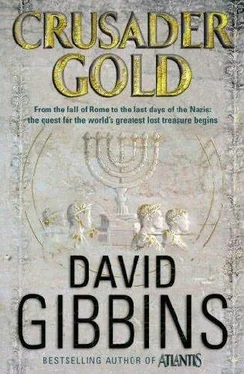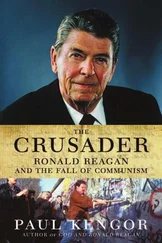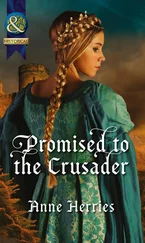David Gibbins - The Crusader's gold
Здесь есть возможность читать онлайн «David Gibbins - The Crusader's gold» весь текст электронной книги совершенно бесплатно (целиком полную версию без сокращений). В некоторых случаях можно слушать аудио, скачать через торрент в формате fb2 и присутствует краткое содержание. Жанр: Прочие приключения, на английском языке. Описание произведения, (предисловие) а так же отзывы посетителей доступны на портале библиотеки ЛибКат.
- Название:The Crusader's gold
- Автор:
- Жанр:
- Год:неизвестен
- ISBN:нет данных
- Рейтинг книги:3 / 5. Голосов: 1
-
Избранное:Добавить в избранное
- Отзывы:
-
Ваша оценка:
- 60
- 1
- 2
- 3
- 4
- 5
The Crusader's gold: краткое содержание, описание и аннотация
Предлагаем к чтению аннотацию, описание, краткое содержание или предисловие (зависит от того, что написал сам автор книги «The Crusader's gold»). Если вы не нашли необходимую информацию о книге — напишите в комментариях, мы постараемся отыскать её.
The Crusader's gold — читать онлайн бесплатно полную книгу (весь текст) целиком
Ниже представлен текст книги, разбитый по страницам. Система сохранения места последней прочитанной страницы, позволяет с удобством читать онлайн бесплатно книгу «The Crusader's gold», без необходимости каждый раз заново искать на чём Вы остановились. Поставьте закладку, и сможете в любой момент перейти на страницу, на которой закончили чтение.
Интервал:
Закладка:
Costas was holding the jade pendant they had found with the skeleton under the cairn, and was peering at the two silver coins mounted in the eyes. After a moment he looked up at Jack, his expression slightly bemused. “So this is all we get of Harald Hardrada’s treasure?”
“One Viking coin, one Roman.” Jack’s face creased in a smile. “I think that’s pretty good, don’t you? By themselves no more than dislocated fragments of history, but together they tell a fantastic story, something I never would have believed possible before all this. We found Harald’s treasure all right. Those coins are worth all the gold in the world.”
“One final question,” Costas said. “The Byzantine princess, Harald’s other treasure from Constantinople. Maria’s namesake. Do you think she really was with him to the end? I fancy her surviving, becoming a fearsome queen of the Toltecs. That would certainly add some spice to history.”
“As if we needed spice after all this,” Jeremy said.
“You thought you saw a woman on the wall-painting, a Viking,” Costas said to Jeremy, who suddenly nodded as he remembered.
“For me, it’s the legend of the Valkyries,” Maria said. “Female riders from the spirit world who chose the slain in battle for Valhalla and then served them in the great feasting hall. I think Maria stayed with Harald to the end, a warrior princess, his thole-companion. She would have accompanied him to the afterlife. It was the Viking way. I think she’s up there now, feasting alongside him with the rest of his noble fellowship, the true felag.”
“Maria, Queen of the Valkyries,” Costas said, deadpan. “From what I’ve seen, it suits you.”
Jack grinned. “Time we sent someone else to join them.”
The ship had been slowing down and was now motionless in the water, the last tendrils of its wake sloughing off in the swell to the south. The captain came clattering down the gangway from the bridge and joined them on the deck. “We’re in position, Jack,” he said. “Any time.”
Jack nodded, looked appraisingly out to sea and then turned to a blanket-wrapped shape on the deck behind him. He carefully unrolled it and a dazzling object came into view. It was the mighty Varangian war axe they had taken from the longship, Halfdan’s prized weapon that had saved Jack and Costas from certain death in the ice. It was the first time Jack had held the axe since they had been winched away from their ordeal, and he felt a tingle down his spine as he clasped the oak haft and raised the gilded steel of the bit until it was level with his head. He slowly turned it from side to side, revealing the pendant shape of Thor’s hammer, Mjollnir, with the wolf’s head in the apex, and above it the double-headed eagle of Rome and Constantinople, all picked out in gold. On the other side he brought his hand against the runic symbols of Halfdan himself, marks made a thousand years ago when Halfdan had served his beloved leader in the glory days of the Varangian Guard, in the greatest city the world had ever seen.
The others moved wordlessly towards Jack and clasped their hands around the shaft. “Battle-luck,” Costas said.
“Battle-luck,” Jack repeated quietly.
Jack’s mind flashed back to the Golden Horn, to the extraordinary adventure that had brought them here. He thought again of Father O’Connor, of all he had done to keep the dark side of history at bay, of the terrible price he had paid.
A sea mist had begun to swirl around them, cutting off the ship and the grey swell from the outside world, as if they had been caught in a time warp. Just over the horizon to the west lay Vinland, the farthest outpost of the Vikings. For a fleeting moment Jack thought he saw the ghostly stern of a longship slipping into the mist, its curving stern carved in the snarling form they had seen in the ice. It was as if they were poised at the place where reality became myth, where the Viking world ended and the spirit world began, a journey into darkness and terror more awful than Harald and his men could ever have imagined.
Jack weighed the axe in his hands, then raised the cold steel and brushed it against his lips. Somewhere near here the last remnant of the iceberg would release Halfdan and his longship into the flow, the same stream that had taken his beloved king to the final showdown at the end of time. Halfdan would need to be girded well, fitted to stand proud alongside the companions of the battles he had fought when the Varangians had no equal in the world of men.
Jack paced forward and with one graceful movement lowered the axe-head behind him and swung the haft high in the air, releasing it at the last moment as the weight pulled him forward. The axe arched high over the stern and began to tumble, catching a sunbeam through the mist and disappearing in a dazzling tumult of light. It was like a wayward bolt of lighting, a swirling flash of energy from the Age of Heroes. Then it sliced into the sea and was gone, leaving only the barest of ripples, soon lost in the swell. Jack felt strangely light-headed, as if a weight had been lifted from his soul, and he leaned against the stern railing and gazed at the grey surface of the sea as the others came up alongside. He found himself mouthing the hallowed words of Old Norse, words that had lost their sinister overtones and spoke of a history more extraordinary than he could ever have imagined.
“Hann til ragnaroks.”
AUTHOR’S NOTE
The Menorah.
The magnificent gold lampstand from the jewish Temple in Jerusalem, looted by the Romans in AD 70, remains one of the greatest lost treasures of history, ranked alongside the Holy Grail and the Ark of the Covenant. The only known depiction of the Temple menorah is on the Arch of Titus in Rome. The triumphal procession shown on the arch is vividly described by Josephus, a Jewish eyewitness and confidant of the emperor Vespasian. Among the spoils of the Temple was a lampstand made of gold: “Affixed to a pedestal was a central shaft, from which there extended slender branches, arranged trident-fashion, a wrought lamp being attached to the extremity of each branch; of these there were seven, indicating the honour paid to that number by the Jews” (Jewish War VII, 149-50). Josephus says little about the fate of the Jewish prisoners-he only describes the execution of their leader, Simon-but he affirms that some of the spoils, at least, survived being melted down: in his new Temple of Peace, Vespasian “laid up the vessels of gold from the Temple of the Jews, on which he prided himself” (VII, 161-62). Other treasure provided bullion for the famous “Judaea Capta” coins, the obverse showing a vanquished female Judaea beneath a Roman standard, above the word IUDAEA.
There are no further eyewitness descriptions of the Temple menorah. However, compelling evidence that it survived-perhaps removed to a secret chamber, such as one actually discovered in the Arch of Titus itself-is provided by the historian Procopius (ca. AD 500-62), in his firsthand account of the spoils taken by the Byzantine general Belisarius when he defeated the Vandals at Carthage in AD 534. They included objects looted by the Vandal king Giseric when he sacked Rome in AD 455, “the treasures of the Jews, which Titus, the son of Vespasian, together with certain others, had brought to Rome after the capture of Jerusalem” (History of the Wars IV, ix, 5-10). According to Procopius, Belisarius brought the treasures to Constantinople-present-day Istanbul-and displayed them in the Hippodrome for the emperor Justinian. Procopius then claims that a Jew persuaded Justinian to return them to “the sanctuaries of the Christians in Jerusalem.” The fact that Procopius describes the arrival of the treasures in Constantinople suggests that the account is authentic, as many of his intended readers would themselves have witnessed the triumph, but his story of their return to Jerusalem seems implausible and a typical embellishment to highlight Justinian’s Christian virtues. There is no credible evidence that the menorah was ever again in Jerusalem after AD 70-71.
Читать дальшеИнтервал:
Закладка:
Похожие книги на «The Crusader's gold»
Представляем Вашему вниманию похожие книги на «The Crusader's gold» списком для выбора. Мы отобрали схожую по названию и смыслу литературу в надежде предоставить читателям больше вариантов отыскать новые, интересные, ещё непрочитанные произведения.
Обсуждение, отзывы о книге «The Crusader's gold» и просто собственные мнения читателей. Оставьте ваши комментарии, напишите, что Вы думаете о произведении, его смысле или главных героях. Укажите что конкретно понравилось, а что нет, и почему Вы так считаете.












